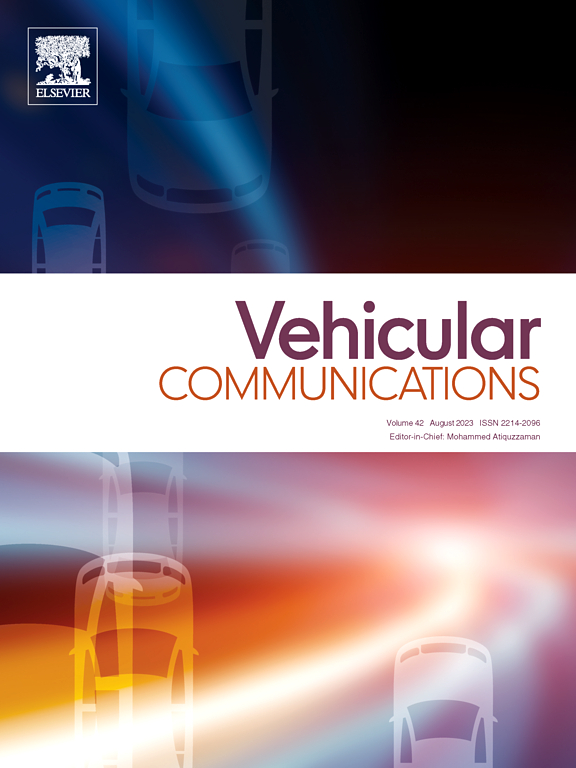一种基于区块链和零知识证明的vanet隐私增强认证方案
IF 6.5
2区 计算机科学
Q1 TELECOMMUNICATIONS
引用次数: 0
摘要
随着智能交通系统(ITS)和自动驾驶技术的快速发展,车辆自组织网络(VANETs)中车辆身份的安全认证和隐私保护成为研究热点。现有的解决方案通常依赖于基于假名的方法。这些方法会产生大量的存储开销和计算成本,从而限制了它们的可伸缩性和效率。为了解决这一问题,本文提出了一种新的VANETs匿名认证方案,该方案协同集成了零知识证明(ZKP)和区块链技术。该方案采用基于身份的多项式承诺来实现保护隐私的身份验证,保证了车辆的匿名性而不泄露敏感信息。另外,基于Gap Diffie-Hellman (GDH)问题的身份签名算法保证了会话的不可链接性,提高了连接的安全性。将Merkle Patricia Trie (MPT)合并到区块链框架中可以优化数据检索效率,同时最大限度地减少中央服务器上的存储和计算负担。区块链固有的不变性和透明性进一步增强了数据的完整性和安全性。本文章由计算机程序翻译,如有差异,请以英文原文为准。
A privacy-enhanced authentication scheme for VANETs based on blockchain and zero-knowledge proof
The rapid development of Intelligent Transportation Systems (ITS) and autonomous driving technologies has made secure authentication and privacy protection of vehicle identities in Vehicular Ad Hoc Networks (VANETs) a hot research issue. Existing solutions typically rely on pseudonym-based approaches. These approaches incur large storage overhead and computational costs, which limit their scalability and efficiency. To address this problem, this paper proposes a novel anonymous authentication scheme in VANETs that synergistically integrates zero-knowledge proof (ZKP) and blockchain technology. An identity-based polynomial commitment is used in the present scheme to achieve privacy-preserving authentication, which ensures the anonymity of the vehicle without revealing sensitive information. Additionally, an identity-based signature algorithm, based on the Gap Diffie-Hellman (GDH) problem, ensures session unlinkability, enhancing connection security. Incorporating the Merkle Patricia Trie (MPT) into the blockchain framework optimizes data retrieval efficiency while minimizing storage and computational burdens on the central server. Blockchain's inherent immutability and transparency further enhance data integrity and security.
求助全文
通过发布文献求助,成功后即可免费获取论文全文。
去求助
来源期刊

Vehicular Communications
Engineering-Electrical and Electronic Engineering
CiteScore
12.70
自引率
10.40%
发文量
88
审稿时长
62 days
期刊介绍:
Vehicular communications is a growing area of communications between vehicles and including roadside communication infrastructure. Advances in wireless communications are making possible sharing of information through real time communications between vehicles and infrastructure. This has led to applications to increase safety of vehicles and communication between passengers and the Internet. Standardization efforts on vehicular communication are also underway to make vehicular transportation safer, greener and easier.
The aim of the journal is to publish high quality peer–reviewed papers in the area of vehicular communications. The scope encompasses all types of communications involving vehicles, including vehicle–to–vehicle and vehicle–to–infrastructure. The scope includes (but not limited to) the following topics related to vehicular communications:
Vehicle to vehicle and vehicle to infrastructure communications
Channel modelling, modulating and coding
Congestion Control and scalability issues
Protocol design, testing and verification
Routing in vehicular networks
Security issues and countermeasures
Deployment and field testing
Reducing energy consumption and enhancing safety of vehicles
Wireless in–car networks
Data collection and dissemination methods
Mobility and handover issues
Safety and driver assistance applications
UAV
Underwater communications
Autonomous cooperative driving
Social networks
Internet of vehicles
Standardization of protocols.
 求助内容:
求助内容: 应助结果提醒方式:
应助结果提醒方式:


